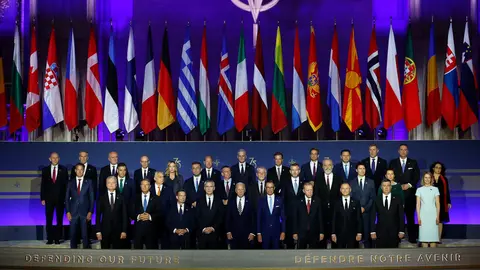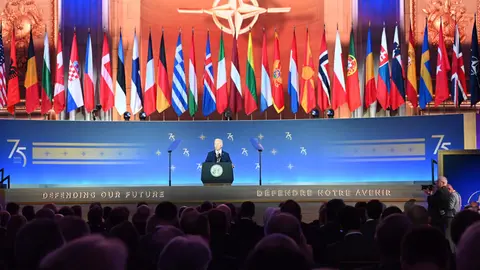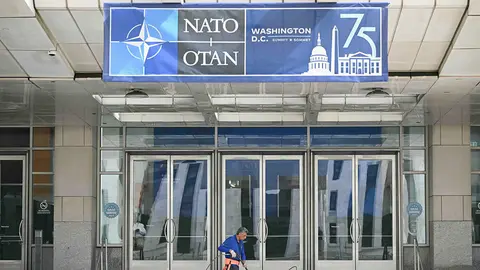Zelensky calls on NATO to lift restrictions on attacks on Russia
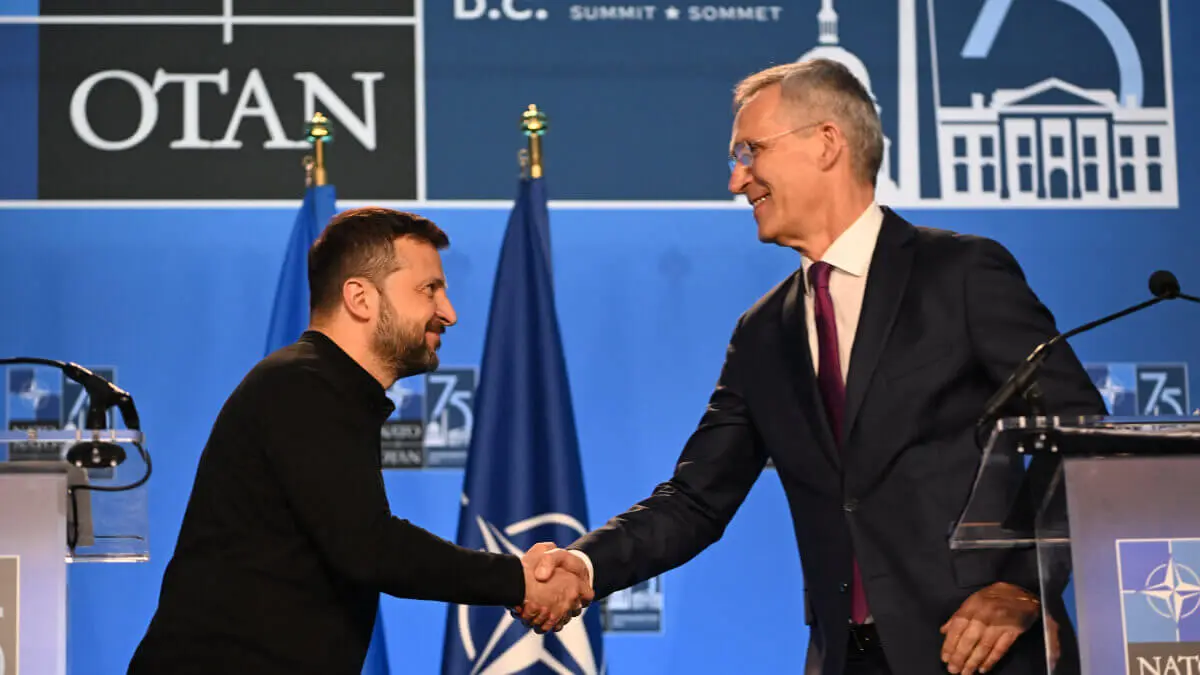
- Biden again publicly equivocates, calling Zelensky "President Putin"
- NATO adopts action plan for southern flank
Ukrainian President Volodimir Zelensky used the closing of the NATO summit to call once again for the removal of all restrictions on Western weaponry to allow Ukrainian forces to reach military targets inside Russia.
Some countries, such as the US and Germany, have allowed Kiev to use their weapons in limited attacks inside the Russian border in response to Moscow's offensive on Kharkov, although they maintained some restrictions on the circumstances and distance at which Ukrainian forces could strike.
"If we want to win, if we want to prevail, if we want to save our country and defend it, we must lift all restrictions," the Ukrainian leader said at the end of a summit at which allies reiterated their firm support for Ukraine in the face of Russia's invasion.
Indeed, NATO members have pledged to strengthen Ukraine's air defences, drawing up a support package that includes a commitment to supply more Patriot missile systems to defend Ukrainian skies.
They also pledged to provide Kiev with a minimum of 40 billion euros -43 billion dollars- in military support "over the next year".
We are doing everything to make Russian terror lose. And not only our country needs it, but everyone needs it, every partner, all nations.
— Volodymyr Zelenskyy / Володимир Зеленський (@ZelenskyyUa) July 12, 2024
And I thank everyone who supports Ukraine. Thank you for the important decisions that help defend lives. pic.twitter.com/1YPqoGtXOP
Another item on the agenda was Ukraine's possible future membership of the Alliance. However, despite past promises, the allies refused to extend a clear invitation to Kiev to join NATO, although they described Ukraine's path to membership as "irreversible".
Despite the lack of a formal invitation, Zelensky is optimistic that "everything possible will continue to be done to ensure that the day will come when Ukraine will be invited and become a member of NATO". "I am sure that we will succeed," he added.
In addition to reaffirming support for Ukraine, the US also announced that from 2026, NATO would begin "episodic deployments" of long-range missiles in Germany to bolster the alliance's deterrence against Russia.
Washington Summit Declaration issued by the Heads of State and Government participating in the meeting of the North Atlantic Council in Washington, D.C.#NATOSummit | #1NATO75years
— NATO (@NATO) July 10, 2024
German Chancellor Olaf Scholz has accepted this decision, noting that it would help "secure the peace".
Russia, meanwhile, was quick to react to the move, saying it was planning "response measures" to contain the "very serious threat" from NATO, accusing the alliance of being "fully involved in the conflict over Ukraine".
Biden again publicly equivocates, calling Zelensky "President Putin"
Besides Ukraine, during the NATO summit all eyes were on US President Joe Biden, who has been under pressure for some time after his debacle in a presidential debate against Trump where he was seen as indecisive and confused. Biden, 81, has ruled out dropping out of the presidential race despite criticism and questions about his health.
During the summit, Biden again misspoke, mistakenly referring to Ukrainian President Voldymyr Zelensky as "President Putin". "I'm going to defeat President Putin. I'm very focused on defeating Putin," Biden said as he corrected himself.
Biden, at NATO summit, calls President Zelensky ‘President Putin’ pic.twitter.com/EoJrhls2co
— Danny Kemp (@dannyctkemp) July 11, 2024
The new gaffe comes shortly after four House Democrats called on Biden to end his campaign. "For the sake of our country, it is time for the president to pass the baton to a new generation of leaders," said Brad Schneider of Illinois, Greg Stanton of Arizona, Ed Case of Hawaii and Hillary Scholten of Michigan in a joint statement.
Meanwhile, other world leaders tried to play down the mistake. French President Emmanuel Macron said that "we all make mistakes sometimes". "It happened to me and it could happen again tomorrow," he added.
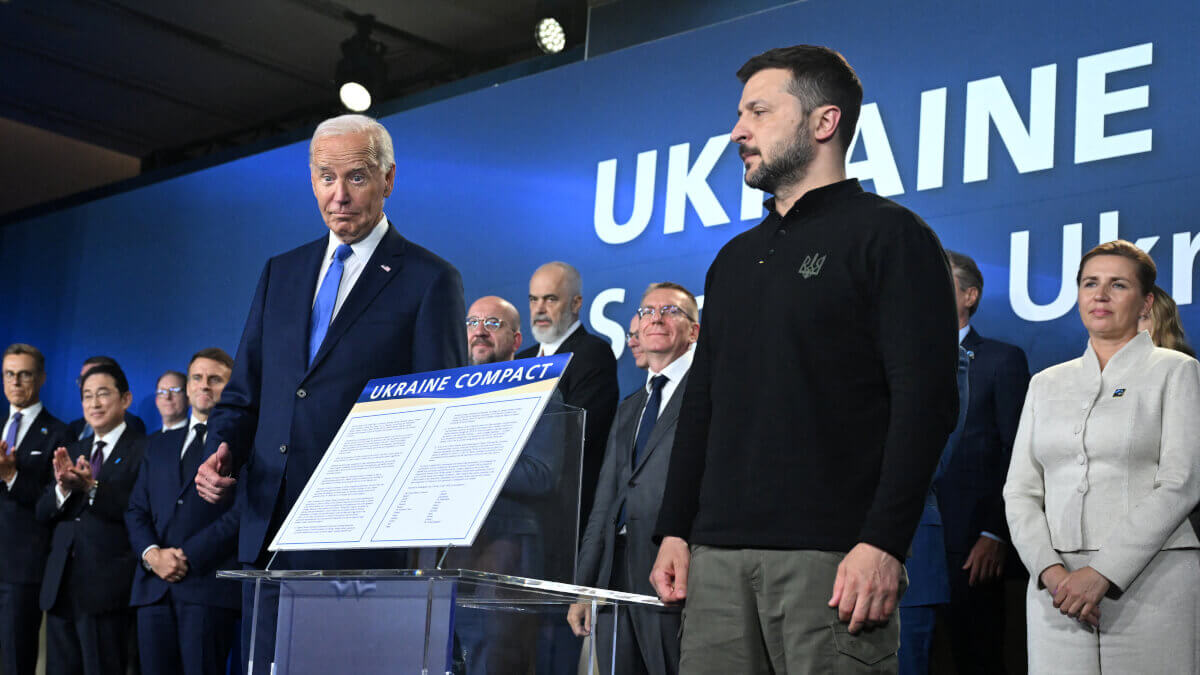
NATO adopts action plan for southern flank
In addition to Russia's invasion of Ukraine and the threats posed by China in the Asia-Pacific region, the southern flank was another key focus of the summit in Washington in recent days.
NATO stressed the need to "promote greater security and stability in the Middle East and Africa, contributing to peace and prosperity in the region".
Hoy, tras dos años de trabajo, la @NATO adopta un Plan de Acción para reforzar nuestro enfoque hacia el sur.
— Pedro Sánchez (@sanchezcastejon) July 10, 2024
Por primera vez, la Alianza dispondrá de una hoja de ruta completa, detallada y práctica para trabajar con nuestros socios del sur.
España ya está preparada para… pic.twitter.com/nUHbYfHBai
"In Vilnius we launched a comprehensive reflection on the threats, challenges and opportunities in the South and today adopted an action plan for stronger, more strategic and results-oriented cooperation towards our southern neighbourhood, which will be regularly updated," the joint statement said.
The text also mentions that the allies agreed to appoint a special envoy for their southern flank to coordinate relations with countries in North Africa and the Middle East to address potential threats such as migrant smuggling networks and terrorism. According to the Alliance, the special representative for the southern flank "will act as a focal point and coordinate NATO's efforts in the region".

